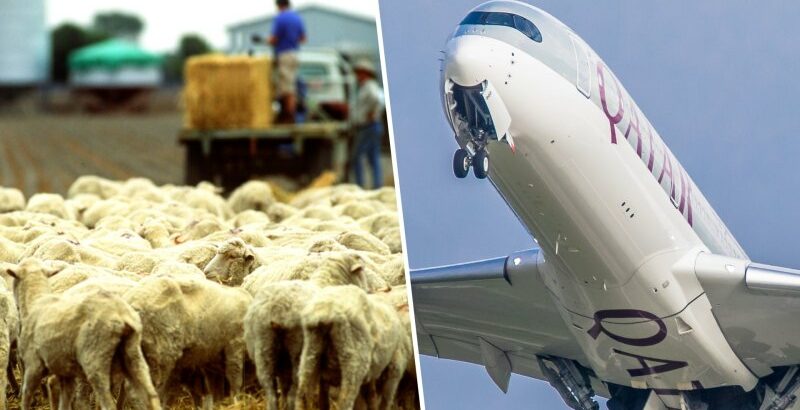Save articles for later
Add articles to your saved list and come back to them any time.
Farmers say they are collateral damage in the federal government’s decision to block the bid by Qatar Airways for 28 extra flights per week, arguing there are limited avenues to expand exports of fresh boxed meat into the lucrative Middle East market at a time they remain below pre-COVID levels.
With the Albanese government facing a mounting political storm over the decision, sheep producers say there has been a failure to appreciate the ramifications of the decision on exporters who were already fighting for air freight space.
Sheep producers say the impact of the Qatar decision on exporters has been eclipsed by a focus on the hit to tourism.Credit: Christopher Pearce
Australian lamb exports are on track for a record year according to the Meat and Livestock Association, with most of the produce shipped frozen by sea to key overseas markets including China, the US, South Korea and the Middle East.
But the industry relies on the availability of cargo hold space in passenger planes to transport premium chilled meat into the Middle East, where consumers prefer fresh rather than frozen meat.
Fletcher International Exports founder Roger Fletcher, one of Australia’s biggest exporters of lamb and sheep meat, said the “bellies of jets is the best way for us to take high-priced premium product”.
“The more jets we’ve got in the air, the better the chance for farmers to open up more markets. You can’t take on more contracts if you can’t get the space,” Fletcher said.
He said farmers were “jostling to get whatever space we can”.
Western Australian sheep farmer Bindi Murray, who was in Canberra last week as part of a delegation of farmers lobbying the government about Labor’s pledge to eventually phase out the live export trade, said the impact of the Qatar decision on exporters had been lost in the focus on the hit to tourism and soaring airfares.
“This is not just about tourism. It is also about the freight that those flights actually enable. As an industry, we’ve been trying to explain this complexity to the government for quite some time,” said Murray who is director of Sheep Producers Australia, the peak industry group.
“It’s just really disheartening because we’re obviously not getting the message through if the government doesn’t understand the dynamics around those flights.
“With live export we can put 60,000 sheep on a boat. Once we go into the chilled market we need to then send lots of small regular amounts. In WA, it’s taken us a lot longer for our passenger freight numbers to rebound and that’s meant that also affected our competitiveness in air freight for our export product as well.”
The Coalition piled pressure on Transport Minister Catherine King last week to explain to parliament why she rejected Qatar’s request on July 10 to double its capacity to Australia by adding 28 flights per week to Sydney, Melbourne, Brisbane and Perth – a decision that ultimately shielded Qantas from more competition on the routes.
King claimed her decision was made in the “national interest” and revealed the invasive physical searches of 13 Australian women by Qatari police at Doha Airport in 2020 was one of the factors on her mind, contradicting comments she made to this masthead six weeks ago when she said it was not a factor.
Opposition Leader Peter Dutton has repeatedly asserted the decision was not about protecting the women, instead accusing Labor of doing a “sweetheart deal” with Qantas that has sustained expensive airfares for Australians.
A Senate inquiry will investigate the decision over the coming month, including the impact on travellers, the tourism and hospitality sectors and the movement of freight.
A spokeswoman for King said there was no restriction on dedicated international air cargo services between Qatar and Australia and that capacity for international travel was at 91 per cent of pre-COVID levels.
“We saw 1,857 international flights operate into Australia in the first week of September alone,” the spokeswoman said.
Agricultural market analyst Matt Dalgleish, from consultancy firm Episode 3, said government data showed that in 2022 less than 20,000 tonnes of chilled sheep meat was airfreighted to the Middle East – down by more than two-thirds from the 60,000 tonne peak in 2018.
He said the decision to deny Qatar extra flights meant a significant opportunity was being lost.
“If we do want to move away from live export, one of the best ways to do it is to pivot towards this chilled fresh product going on planes to them,” Dalgleish said. “Yet we’re cutting our nose off to spite our face by this decision, where we’re not demonstrating that that’s what we really want to do and showing we’re a reliable partner.”
Coalition transport spokeswoman Bridget McKenzie said WA sheep producers in particular “already face challenges exporting processed sheepmeat due to restricted export capacity, high air freight prices and limited margins”.
“Additional international passenger flights will be desperately needed out of Perth to create additional export capacity and competition which should help push freight prices down to make the trade of extra slaughtered sheepmeat viable,” she said.
The Morning Edition newsletter is our guide to the day’s most important and interesting stories, analysis and insights. Sign up here.
Most Viewed in Politics
From our partners
Source: Read Full Article

